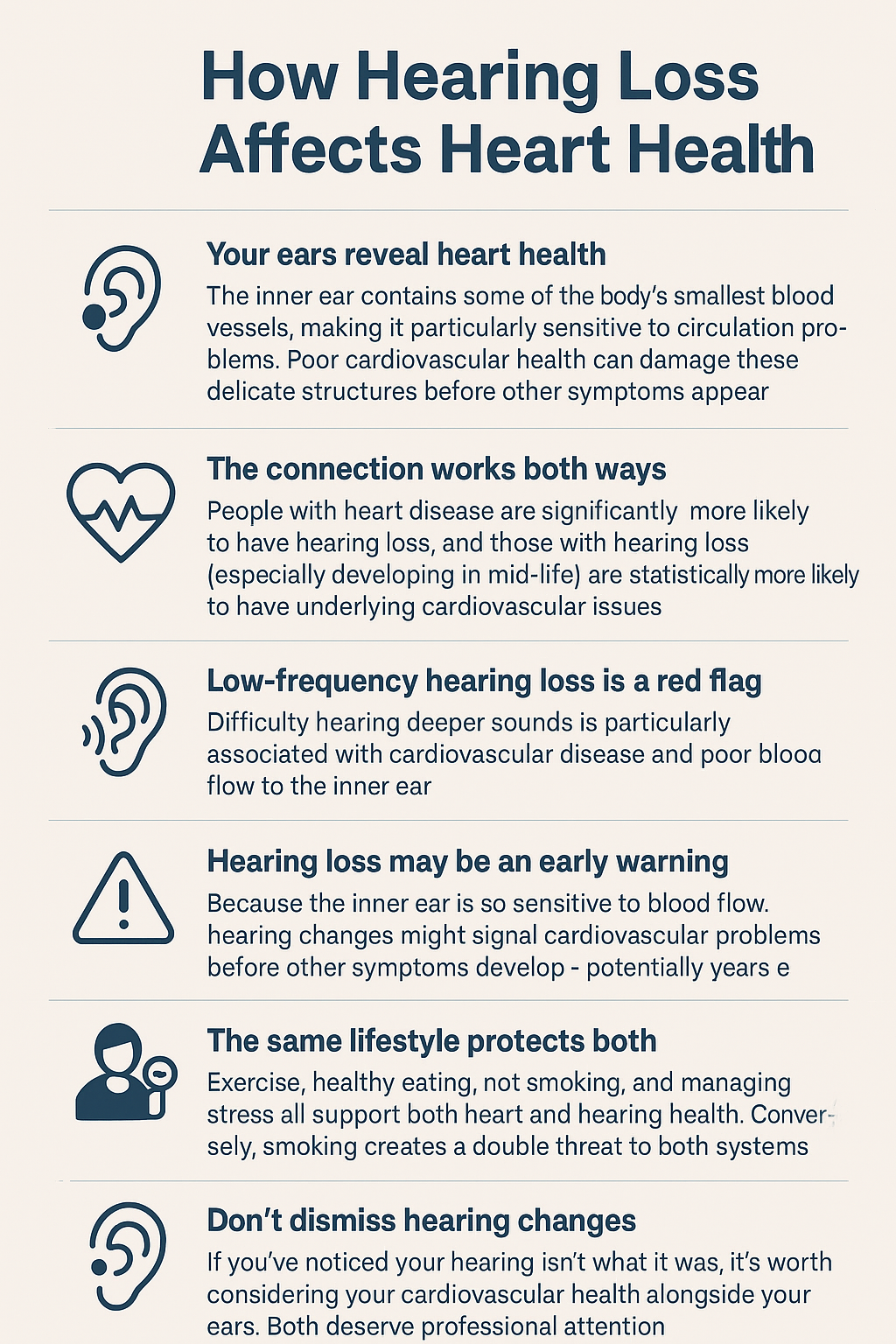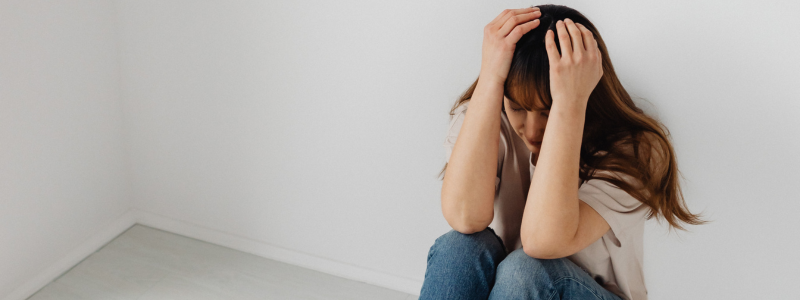
Head of Online Medical Content

Audiology Expert

Hearing Loss and Cardiovascular Disease
The heart-hearing connection
Overview | Why your ears care about your heart | The research | What this means | Why this matters | Conclusion
Last Hearing Aid UK Update:
Overview
The connection between hearing loss and cardiovascular disease isn't immediately obvious, but it's rather significant. Your ears, particularly the delicate structures of the inner ear, are remarkably sensitive to blood flow.
In fact, they're so sensitive that problems with your cardiovascular system can show up as hearing difficulties long before you notice other symptoms. If you've been putting off a hearing test, this might give you pause for thought.
Why your ears care about your heart
Your inner ear is effectively powered by some of the smallest blood vessels in your body. These tiny vessels deliver oxygen and nutrients to the hair cells responsible for converting sound waves into the signals your brain interprets as hearing.
When your cardiovascular system isn't working optimally, these microscopic structures are often among the first to suffer.
Poor circulation, atherosclerosis, high blood pressure, and diabetes can all restrict blood flow to the inner ear. Unlike other parts of your body that might compensate for reduced blood supply, these delicate hair cells are particularly vulnerable. Once damaged, they don't regenerate, which means the hearing loss can be permanent.
The research
Multiple studies have found a correlation between cardiovascular disease and hearing loss. People with heart disease are significantly more likely to have hearing impairment than those with healthy cardiovascular systems.
The relationship works both ways, too. For example, if you have hearing loss, particularly if it's developed in mid-life, you're statistically more likely to have underlying cardiovascular issues.
One particularly interesting study found that people with low-frequency hearing loss (affecting deeper sounds) were more likely to have cardiovascular disease.
This makes sense when you consider that low-frequency hearing loss is often associated with poor blood flow to the inner ear.
What this means for you
If you've noticed your hearing isn't what it used to be, it might be worth thinking about more than just your ears. Hearing loss could be an early warning sign that your cardiovascular system needs attention.
Equally, if you have heart disease, diabetes, or high blood pressure, you might be at increased risk for hearing problems even if you haven't noticed any symptoms yet.
Managing cardiovascular risk factors, such as maintaining healthy blood pressure, controlling cholesterol, exercising regularly, and not smoking, doesn't just protect your heart; it might also help preserve your hearing.
Related reading: Diabetes and hearing loss
The lifestyle connection
The lifestyle factors that protect your heart, including regular exercise, a balanced diet, not smoking, and managing stress, are the same ones that help preserve your hearing.
Exercise improves blood flow throughout your body, including to those delicate structures in your inner ear. A diet rich in omega-3 fatty acids, antioxidants, and vitamins supports both cardiovascular and auditory health.
Smoking, on the other hand, is particularly problematic for both systems, as it damages blood vessels and reduces oxygen in the blood, creating a double threat to your hearing.

Why this matters now
Hearing loss often develops gradually, and many people dismiss it as a normal part of ageing. But if that hearing loss is actually a warning sign about your cardiovascular health, waiting years to address it means potentially missing an opportunity for early intervention.
Cardiovascular disease is still the leading cause of death in the UK, and if your ears are trying to tell you something about your heart health, it's worth listening.
A practical perspective
Please also remember that if you have hearing loss, this doesn't automatically mean you have heart disease, and vice versa. But the connection is strong enough that it's worth discussing with healthcare professionals.
If you're seeing an audiologist about your hearing, mention any cardiovascular concerns. If you're seeing a GP about heart health, don't dismiss hearing changes as inconsequential.
Regular hearing tests become particularly important if you have cardiovascular risk factors, and they're quick, painless, and might provide valuable information about your overall health beyond just how well you're hearing.
Conclusion
Poor cardiovascular health can damage the structure of the inner ear, which can lead to permanent hearing loss. For example, the inner ear's tiny blood vessels are vulnerable to circulation problems.
The lifestyle factors that protect your heart, such as exercise, healthy eating, and not smoking, also help preserve your hearing. If you have cardiovascular disease or risk factors, your hearing deserves extra attention.
Similarly, if you've noticed hearing changes, it might be worth considering your cardiovascular health.
Regular hearing tests aren't just about your ears; they might provide early warning signs about your overall health. The sooner you address either hearing loss or cardiovascular concerns, the better your outcomes are likely to be.
Why Choose Us?
- FREE Hearing Tests
- Best Hearing Aids and Prices
- FREE Aftercare for Life
- FREE Home Visits
- 200+ Local Audiologists
- 60 Day Money Back Guarantee
Noticed changes in your hearing?
If you think that your cardiovascular health is affecting your hearing, you must first see your local GP.
Book a free hearing test with one of our qualified audiologists who can assess your hearing, discuss how your it might be affecting your daily life, and talk through the options.
Whether you're exploring hearing aids for the first time, looking for a second opinion, or considering upgrading from your current devices, we're here to help with honest, independent advice.
Other hearing loss awareness articles you might like...
 Hearing aid stigma
Hearing aid stigma  The impact of diet on your hearing
The impact of diet on your hearing  How to tell if hearing loss is permanent or temporary
How to tell if hearing loss is permanent or temporary Watch the Everyday Kentucky's video on hearing loss and heart disease below
Other pages you might find useful
FAQs
In general, any audiologist will always recommend to you the hearing aid model that best suits your needs. Here is a useful checklist to make sure that is the case.
- Audiologist's level of knowledge: The audiologist you have seen will hopefully have a wide knowledge of all available hearing aids; however, some will only be familiar with a small number of brands and, therefore, may not really be in a position to know which model is the best for you. It is OK to challenge their recommendation and ask them to justify why this particular brand is the one for you.
- Do research: Read about the hearing aid that was recommended. Does it seem like it will suit your lifestyle? Does it have more or fewer features than you need?
- Be aware of sales targets: Many high street retailers have specific tie-ins to a particular manufacturer/brand. The hearing aid they have suggested may still be the correct one for you, but do your research so that you know why they might have recommended it.
If you have significant hearing loss in both ears, you should be wearing two hearing aids. Here are the audiological reasons why:
Localisation: The brain decodes information from both ears and compares and contrasts them. By analysing the minuscule time delays as well as the difference in the loudness of each sound reaching the ears, the person is able to accurately locate a sound source.
Simply put, if you have better hearing on one side than the other, you can't accurately tell what direction sounds are coming from.
Less amplification is required: A phenomenon known as “binaural summation” means that the hearing aids can be set at a lower and more natural volume setting than if you wore only one hearing aid.
Head shadow effect: High frequencies, the part of your hearing that gives clarity and meaning to speech sounds, cannot bend around your head. Only low frequencies can. Therefore, if someone is talking on your unaided side, you are likely to hear that they are speaking, but be unable to tell what they have said.
Noise reduction: The brain has its own built-in noise reduction, which is only really effective when it is receiving information from both ears. If only one ear is aided, even with the best hearing aid in the world, it will be difficult for you to hear in background noise as your brain is trying to retain all of the sounds (including background noise) rather than filtering them out.
Sound quality: We are designed to hear in stereo. Only hearing from one side sounds a lot less natural to us.
Fancy some further reading on this topic? You can read about why two hearing aids are better than one in our article, hearing aids for Both Ears, here
For most people, the main benefit of a rechargeable hearing aid is simple convenience. We are used to plugging in our phones and other devices overnight for them to charge up. Here are some other pros and cons:
For anybody with poor dexterity or issues with their fingers, having a rechargeable aid makes a huge difference, as normal hearing aid batteries are quite small and some people find them fiddly to change.
One downside is that if you forget to charge your hearing aid, then it is a problem that can't be instantly fixed. For most, a 30-minute charge will get you at least two or three hours of hearing, but if you are the type of person who is likely to forget to plug them in regularly, then you're probably better off with standard batteries.
Rechargeable aids are also a little bit bigger and are only available in Behind-the-Ear models.
Finally, just like with a mobile phone, the amount of charge you get on day one is not going to be the same as you get a few years down the line. Be sure to ask what the policy is with the manufacturer's warranty when it comes to replacing the battery.
For most people, the answer is yes. But it's never that simple.
The majority of hearing problems affect the high frequencies a lot more than the low ones. Therefore, open fitting hearing aids sound a lot more natural and ones that block your ears up can make your own voice sound like you are talking with your head in a bucket. Therefore, in-ear aids tend to be less natural.
However, the true answer is we can't tell until we have had a look in your ears to assess the size of your ear canal, and until we have tested your hearing to see which frequencies are being affected.
People with wider ear canals tend to have more flexibility, also there are open fitting modular CIC hearing aids now that do not block your ears.
There is also the age-old rule to consider, that a hearing aid will not help you if it's sat in the drawer gathering dust. If the only hearing aid you would be happy wearing is one that people can't see, then that's what you should get.
Most people can adapt to any type of hearing aid, as long as they know what to expect. Have an honest conversation with your audiologist as to what your needs are.
Generally speaking, six or more. Unless it's none at all. The number of channels a hearing aid has is often a simplistic way an audiologist will use to explain why one hearing aid is better than another, but channels are complex, and it is really not that straightforward. Here are some reasons why:
Hearing aids amplify sounds of different frequencies by different amounts. Most people have lost more high frequencies than low, and therefore need more amplification in the high frequencies. The range of sounds you hear is split into frequency bands or channels, and the hearing aids are set to provide the right amount of hearing at each frequency level.
Less than six channels, and this cannot be done with much accuracy, so six is the magic number. However, a six-channel aid is typically very basic with few other features and is suitable only for hearing a single speaker in a quiet room. The number of channels is not what you should be looking at; it's more the rest of the technology that comes with them.
As a final note, different manufacturers have different approaches. One method is not necessarily better than any other. For example, some manufacturers have as many as 64 channels in their top aids. Most tend to have between 17 and 20. One manufacturer has no channels at all.
Manufacturer's warranties typically last between 2-5 years, depending on the brand and model, and cover defects in materials and workmanship. This includes repairs for component failures, electronic malfunctions, and manufacturing defects, but excludes damage from misuse, accidents, or normal wear. Most manufacturers also include loss and damage insurance for the first year.
We handle all warranty claims on your behalf, liaising with manufacturers and ensuring you get replacement devices quickly when needed. This comprehensive warranty coverage, combined with our lifetime aftercare, gives you complete peace of mind.
Our hearing tests are completely free, whether at our clinics or in your home. Unlike other providers who charge £30-£100 for home visits, we believe hearing healthcare should be accessible without financial barriers. Our comprehensive assessments include examination by a registered audiologist, audiogram results, and personalised recommendations.
All testing, future adjustments, and ongoing support are included at no extra cost. While NHS tests are also free, typical 6-week waiting periods often lead people to seek immediate private testing. We provide prompt, professional assessments that fit your schedule and budget.
Yes, we offer completely free home visits throughout the UK, and this service is included in our prices with no additional charges. Home visits are particularly valuable for people with mobility issues, busy schedules, or those who simply prefer the comfort and convenience of their own environment.
Our audiologists can conduct full hearing tests, fit hearing aids, and provide ongoing support in your home. This service sets us apart from many providers who either don't offer home visits or charge extra for them.
We can offer prices up to 40% lower than high street retailers because of our business model. As a network of 200+ independent audiologists, we don't have the massive overheads of large retail chains - no expensive high street premises, no sales targets pushing audiologists to sell the most expensive options, and no costly marketing campaigns.
However, we maintain the same buying power as the big chains because we purchase on behalf of our entire nationwide network. This means you get access to the same premium hearing aids with professional service, but at genuinely competitive prices.
We offer a comprehensive 60-day money-back guarantee, which gives you twice the industry standard time to properly assess whether your hearing aids are right for you. This extended period recognises that adjusting to hearing aids takes time, and your brain needs several weeks to adapt to the amplified sounds.
Unlike many providers who offer just 30 days, we believe 60 days gives you the confidence to test your hearing aids in all the situations that matter to you - from quiet conversations at home to busy restaurants and outdoor activities.
Ask the Experts
6 Morton Lane
Walkwood
Redditch
Worcestershire
B97 5QA
Latest Launch
When we refer to a product as 'Latest Launch', we mean it is the latest to be released on the market.
New
When we refer to a product as 'New', we mean that the product is the newest hearing aid model on the market.
When we refer to a product as 'Superseded', we mean that there is a newer range available which replaces and improves on this product.
Older Model
When we refer to a product as an 'Older Model', we mean that it is has been superseded by at least two more recent hearing aid ranges.
